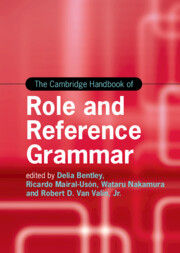Book contents
- The Cambridge Handbook of Role and Reference Grammar
- Cambridge Handbooks in Language and Linguistics
- The Cambridge Handbook of Role and Reference Grammar
- Copyright page
- Dedication
- Contents
- Figures
- Tables
- Contributors
- Pedagogical Guide to The Cambridge Handbook of Role and Reference Grammar
- Introduction
- Part One Overview
- Part Two Topics in RRG: Simple Sentences
- Part Three Topics in RRG: Complex Sentences
- Part Four Applications of RRG
- 17 Role and Reference Grammar and Diachronic Syntax
- 18 Functional Acquisition Processes in Child Language
- 19 Grammatical Aspects of Language Processing in the Brain
- 20 Formalization of RRG Syntax
- 21 Computational Implementation and Applications of Role and Reference Grammar
- Part Five Grammatical Sketches
- Index
- References
17 - Role and Reference Grammar and Diachronic Syntax
from Part Four - Applications of RRG
Published online by Cambridge University Press: 08 June 2023
- The Cambridge Handbook of Role and Reference Grammar
- Cambridge Handbooks in Language and Linguistics
- The Cambridge Handbook of Role and Reference Grammar
- Copyright page
- Dedication
- Contents
- Figures
- Tables
- Contributors
- Pedagogical Guide to The Cambridge Handbook of Role and Reference Grammar
- Introduction
- Part One Overview
- Part Two Topics in RRG: Simple Sentences
- Part Three Topics in RRG: Complex Sentences
- Part Four Applications of RRG
- 17 Role and Reference Grammar and Diachronic Syntax
- 18 Functional Acquisition Processes in Child Language
- 19 Grammatical Aspects of Language Processing in the Brain
- 20 Formalization of RRG Syntax
- 21 Computational Implementation and Applications of Role and Reference Grammar
- Part Five Grammatical Sketches
- Index
- References
Summary
This chapter reviews the existing Role and Reference Grammar (RRG) work on diachronic syntax and morphosyntax and shows how the tools of language description developed by RRG can also be used to account for several aspects of language change. Drawing evidence from developments which have occurred in a wide range of languages, it is argued that RRG allows for a more fine-grained analysis of diachronic processes than theoretically neutral approaches, that it answers fundamental questions about the nature and causes of syntactic change, and that it is not a mere tool of linguistic description, but a theory that makes falsifiable empirical predictions.
Keywords
- Type
- Chapter
- Information
- The Cambridge Handbook of Role and Reference Grammar , pp. 647 - 665Publisher: Cambridge University PressPrint publication year: 2023

